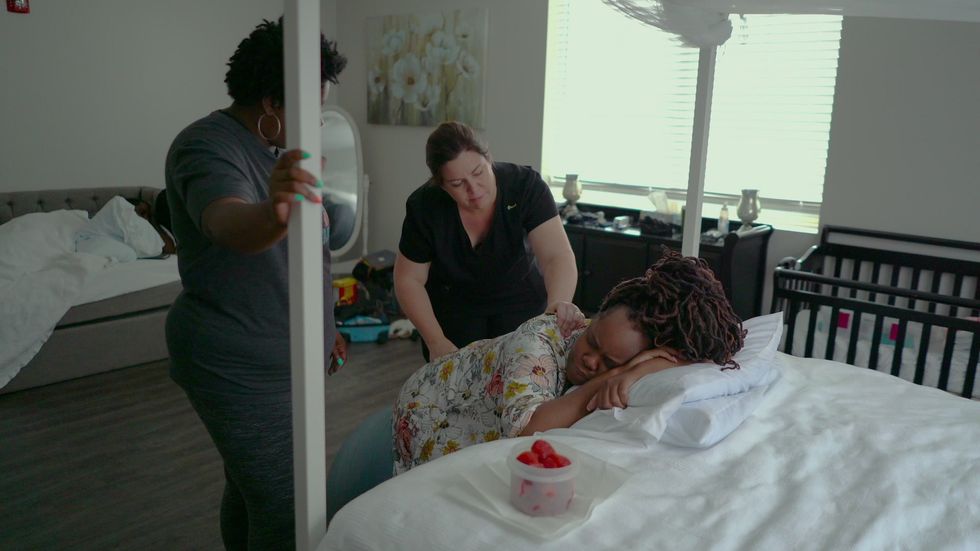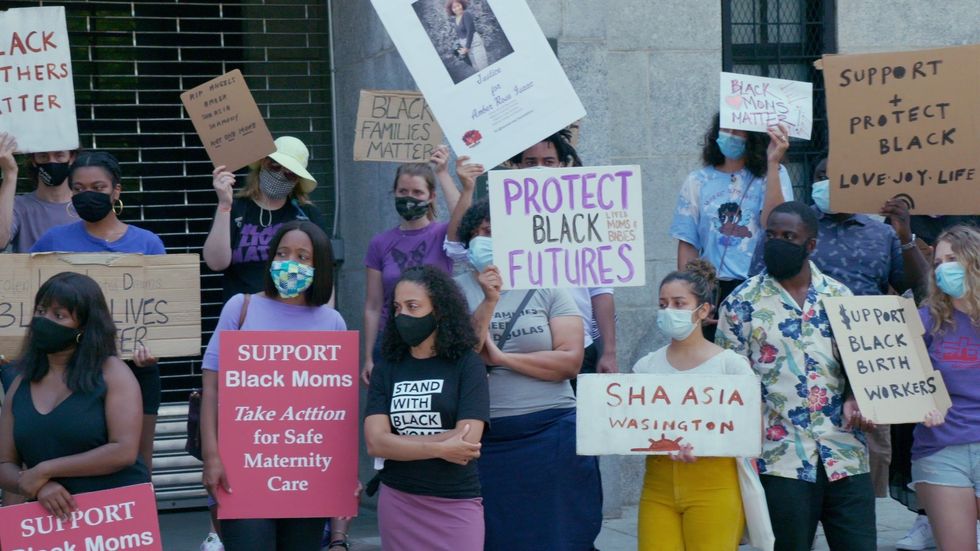Tonya Lewis Lee's Hulu Documentary 'Aftershock' Investigates How To Reduce Black Maternal Mortality

Black women take center stage in April, celebrating International Black Women's History Month. In addition, April 11-17 sheds light on Black Maternal Health Week to raise awareness of the disparity of mortality rates among Black women compared to their non-Hispanic white counterparts. The discussions surrounding Black maternal mortality are becoming more mainstream with Baby Dove joining Sista Midwife Productions, "a birth advocacy, training, and consulting agency," to comprise a comprehensive list of the Black Doula Directory.
Tonya Lewis Lee has become a staunch advocate of ensuring that the American public is cognizant of alarming statistics that show "Black women are three times more likely to die from a pregnancy-related cause than White women" even though 80% of "pregnancy-related deaths in the U.S. are preventable," according to the Centers for Disease Control and Prevention. Bias, racial and gender inequities are prevalent in the American healthcare system, including other disparities such as "quality healthcare, underlying chronic conditions, and structural racism," all impair marginalized patients from having the same opportunities to receive care to uphold their "economic, physical, and emotional health," the CDC reports.
According to the organization's report, approximately 700 women die in the U.S. from pregnancy or various other pregnancy-related complications. Recently, in Detroit, Michigan, Alona White, a 25-year-old mother, died after giving birth to her second daughter; White succumbed to an emergency craniotomy that caused her brain to bleed. As a patient at Ascension St. John Moross, White underwent a C-section, a medical procedure that Lee’s documentary Aftershock also explores and shows the financial benefits hospitals and doctors reap from this particular surgery, even though it may not be conducive to the birthing process.
Lee, who co-directed and co-produced with Paula Eiselt, discusses through her documentary Aftershock about Black maternal health and places several human faces to those victimized by this growing health crisis. The Hulu doc, which is a part of the streaming service's Onyx Collective, initially premiered at the 2022 Sundance Film Festival in the U.S. Doc Competition and was awarded the Special Jury Award: Impact for Change. Aftershock follows Omari Maynard and Bruce McIntyre, who both lost their partners, Shamony Makeba Gibson and Amber Rose Isaac, during childbirth, and how the two men, along with other family members, are in the streets providing advocacy and activism to eradicate this epidemic.
Using her background as a former human rights attorney, a spokesperson for the U.S. Department of Health and Human Services Office of Minority Health, and an author of the children's book Please, Baby, Please—which she co-wrote with her Academy awarding-winning husband, Spike Lee, she uses her platform to heighten the conversation of Black maternal health.

L-R Omari Maynard and Bruce McIntyre
Photo courtesy of Onyx Collective
xoNecole: Based on your research, what are the factors causing Black women's death in most hospitals? The documentary did expound on it, but if you can say it in your own words.
Tonya Lewis Lee: First, I want to say that most of these deaths happening with Black women from childbirth complications are preventable. When we were making the film, 65% of these deaths were preventable. Since then, a new statistic has come out that says 85% of these deaths are preventable. When you asked me what we discovered in our research about why this is happening? First and foremost, what keeps coming through is very clear that Black women are being dismissed and ignored when they express pain or discomfort or something is not right. A lot of these deaths are postpartum.
It's frustrating because it's not like women aren't seeking help, as you see in Aftershock. The two families that we cover, the two women who passed away, each of them were seeking help from their healthcare providers. Unfortunately, their calls for help were dismissed, minimized, and ultimately led to their death. I will say that what tends to happen is there is either too little intervention too late, or there tends to be too much intervention done too soon, which, unfortunately, often causes these deaths.
xoN: Is this something that residents are taught in medical school because, like the doc pointed out, the founder of gynecology J. Marion Sims, believed Black women don't feel pain? Is this ideology still continually introduced in medical schools?
TLL: My understanding, and I've heard, anecdotally, that it is still taught in med schools today that Black people do not suffer or have the same kind of pain that white patients do, which is insane to me that we're still having these conversations. I empathize with doctors because I think they are trained in such a way--it's a patriarchal, technocratic system. They go through rigorous training, which is great, but they're also kind of dehumanized doctors, when they're going through a process so that by the time they get to their patients, they often inadvertently treat their patients in the way they have to rush, let's get through to the problem. What's the problem? Let's solve it.
I'll go back to the question you asked before about what's causing these deaths also, is that [birthing] is not woman-centered, and what I mean by that is, when a woman is giving birth, as opposed to listening to her desires and how she wants to give birth and who she needs in the room, what is she doing and how is it working for her? Unfortunately, a lot of times, it's more on the doctor's schedule, what works for the doctor, and what's efficient for the doctor. Why do we lay on our backs and put our legs up? Well, because it's easier for the doctor to get in there than allowing a woman to move around during her labor to help the baby work its way down. So the baby gets in position, and she's able to do what she wants to do. I think that a lot of education works against the natural birthing process.
xoN: Regarding the medical schools, is there any way we can change how they're instructed? How can we upgrade their curriculum on how they handle Black maternity?
TLL: I agree with you, and I will say, at least some of the good news; I see that with Aftershock, we've been invited by medical schools to bring the film. We were at Harvard and Columbia [to show the film] to their residents and converse with me, my co-director, and the film's protagonist. To your point, they need to be educated; differently, they're beginning to understand that and are looking at it [but] it's going to take a little bit of time to turn the ship. But at least there's a conversation that is starting to happen, but I completely agree with you that med schools need to start thinking about how they teach maternal care.
And again, even the midwifery programs, too, because I am a big advocate for midwives. Yet, they're not enough midwives in general in the United States, and they're certainly not enough Black midwives. So, to that point, we also need to work on the pipeline of doctors, obstetricians, and gynecologists, because there's a shortage of doctors. There's a shortage of nurses, and certainly Black nurses and doctors. We want to think about who's going to med school and how we cultivate them so that we have a workforce that can care for all of us.

Photo courtesy of Onyx Collective
xoN: To add to that point, maybe there should be a movement to have Black owned hospitals. Many Jewish communities have their own doctors and ambulances. Is that also something we need to start putting on our agenda to start creating Black-owned hospitals in these cities with a high Black population?
TLL: I think we can [have] Black hospitals; we're talking about education in general. Our issue as a community is whether we need more resources or we need to focus the resources in that way. It's worth thinking about. Looking to our HBCUs, our Black students, bringing them through to get us to a place where we could create that kind of thing. I don't think it's a bad thing. A study showed that when Black doctors treat Black infants, they have better outcomes. So I think a movement towards ensuring that we have more Black doctors, more Black nurses, a robust Black health care system to begin with, or at least doctors. Having an awesome Black hospital that's important for us would be amazing because we do not have the resources to do that.
xoN: How can we change policy as it relates to the health of Black women when they're giving birth? What can we do?
TLL: Well, the good news is policies are moving through Congress right now, the Momnibus bills, its pieces of legislation, a group of bills. One in particular that is great that I believe recently passed is making sure that women have Medicaid coverage through their first year of birthing; I think it's important that we deal with women a year postpartum because, again, as I said earlier, most of these deaths do happen postpartum. Many women who don't have coverage get lost, and they don't see doctors thereafter or are not seen. We need to ensure policies that make sure that women have the support they need. For example, doulas get covered by insurance companies and Medicaid as well.
I think midwives are really important to this process; the United States is the only industrialized nation that does not have midwifery care at the center of women's health care. So we need to ensure that when women go to midwives, they can get reimbursed. So those are some policies that can have an impact. I will say voting matters because our politicians, locally at the federal level, but particularly locally, and our state and local governments are the ones that drive the policies and our communities around birthing. I think, as individuals, we need to be out there voting, ensuring women can get the support they need.
Also, to the voting piece because many hospitals in the Black communities have been divested from [offering] the services, if they do have maternal health care at all. They don't have a lot of services. So we want to make sure that our hospitals and our communities are well-resourced so that they can provide the care they need for people, especially when they're in distress.

Photo courtesy of Onyx Collective
xoN: What was your experience when you gave birth to your children?
TLL: I appreciate that question. It's interesting. When I gave birth to my children, my daughter is now 27; my son is 25. I didn't know about midwives. So I had a wonderful doctor who was a friend of the family. But even then, I look back with a little frustration because my water broke, I went to the hospital, my family was there, and it was like, 'We can just move this thing along, let's get you on Pitocin get you going,' and I did that and stayed in the hospital overnight. Then the contractions were coming hard, as they do, especially when you're on Pitocin.
They suggested that I have an epidural, which I had. Then, my lips started to numb because they told me I was only supposed to be numb from the waist down. But I was beginning to feel numb over my entire body. I told my anesthesiologist to turn it down, my lips were numb, and she kept saying, 'Well, no, if I turn it down, I have to turn it off, and you're gonna feel pain.' I was like, I need to feel something because I'm now not feeling anything. I had to get nasty with her and didn't want to do it. Because you're laying there, you're vulnerable; I couldn't move. My mother and sister were there, and then they started noticing my oxygen levels were getting weird. I was like, 'You need to turn it off, and I had to get nasty for [the nurse to] finally turn down the anesthesia so that I can at least feel something. Thank God everything was fine, and my daughter was fine. Similarly with my son, a different doctor this time, by the way, both Black women, lovely people, but in a system, right?
With my son, the same thing happened; similarly, my water began to leak, and I was saved in a way by the nurse because at one point I was pushing, and the doctor was like, 'Okay, his umbilical cord is around his neck, his shoulders are stuck,' and she just stopped. The nurse said, 'This may hurt a little bit,' She put her hands on my stomach and pushed my son out. Again, I was fine, thank God, and the children are fine, but in retrospect, I wish I had allowed my body time to do what it wanted to do, and I think I would have been fine. I don't think I needed Pitocin. I don't think I needed the epidural if I had done it that way. But that's the way I did it back then.
But I joke with my daughter that by the time she's ready, I'm ready, and we're going to get it right this time because I don't think that surviving birth is what it should be. I think we should thrive in our births and be able to have beautiful birthing experiences that are not with trauma. And I'm not saying they don't have pain, but I believe that the pain that one goes through is what we're supposed to go through. I don't think women should suffer. But as Helena Grant, the midwife in our film, says that when a woman is birthing a baby, she's not just birthing a baby, she's birthing a mother, and it's a rite of passage that we have to go through to get on that other side. So we are prepared to take care of this young life we've just brought here.
xoN: How can women protect themselves when pregnant or about to give birth in this environment?
TLL: First of all, shop around for your healthcare provider. If you go to a health care provider and you don't connect with them, then keep looking for that health care provider that is right for you. First and foremost, ask as many questions as you can ask. Remember that you're in the power seat, you should be empowered; you're about to go through something amazing. Make sure you get the support you need. No [woman] can be doing everything in the moment of labor and birthing.
So make sure you have the right energy and people around you who can advocate for you and support you the way you need during your birthing process. I was with these people through the process of this documentary. I was able to be up close and personal with people grieving from a loss but activated by the loss. I was able to be up close and personal with people going through the birthing process themselves, trying to figure it out for themselves as well. So it's been quite a journey.
Aftershock is now streaming on Hulu.
Let’s make things inbox official! Sign up for the xoNecole newsletter for daily love, wellness, career, and exclusive content delivered straight to your inbox.
Feature image by Keith Williams
Because We Are Still IT, Girl: It Girl 100 Returns
Last year, when our xoNecole team dropped our inaugural It Girl 100 honoree list, the world felt, ahem, a bit brighter.
It was March 2024, and we still had a Black woman as the Vice President of the United States. DEI rollbacks weren’t being tossed around like confetti. And more than 300,000 Black women were still gainfully employed in the workforce.
Though that was just nineteen months ago, things were different. Perhaps the world then felt more receptive to our light as Black women.
At the time, we launched It Girl 100 to spotlight the huge motion we were making as dope, GenZennial Black women leaving our mark on culture. The girls were on the rise, flourishing, drinking their water, minding their business, leading companies, and learning to do it all softly, in rest. We wanted to celebrate that momentum—because we love that for us.
So, we handpicked one hundred It Girls who embody that palpable It Factor moving through us as young Black women, the kind of motion lighting up the world both IRL and across the internet.
It Girl 100 became xoNecole’s most successful program, with the hashtag organically reaching more than forty million impressions on Instagram in just twenty-four hours. Yes, it caught on like wildfire because we celebrated some of the most brilliant and influential GenZennial women of color setting trends and shaping culture. But more than that, it resonated because the women we celebrated felt seen.
Many were already known in their industries for keeping this generation fly and lit, but rarely received recognition or flowers. It Girl 100 became a safe space to be uplifted, and for us as Black women to bask in what felt like an era of our brilliance, beauty, and boundless influence on full display.
And then, almost overnight, it was as if the rug was pulled from under us as Black women, as the It Girls of the world.
Our much-needed, much-deserved season of ease and soft living quickly metamorphosed into a time of self-preservation and survival. Our motion and economic progression seemed strategically slowed, our light under siege.
The air feels heavier now. The headlines colder. Our Black girl magic is being picked apart and politicized for simply existing.
With that climate shift, as we prepare to launch our second annual It Girl 100 honoree list, our team has had to dig deep on the purpose and intention behind this year’s list. Knowing the spirit of It Girl 100 is about motion, sauce, strides, and progression, how do we celebrate amid uncertainty and collective grief when the juice feels like it is being squeezed out of us?
As we wrestled with that question, we were reminded that this tension isn’t new. Black women have always had to find joy in the midst of struggle, to create light even in the darkest corners. We have carried the weight of scrutiny for generations, expected to be strong, to serve, to smile through the sting. But this moment feels different. It feels deeply personal.
We are living at the intersection of liberation and backlash. We are learning to take off our capes, to say no when we are tired, to embrace softness without apology.
And somehow, the world has found new ways to punish us for it.

In lifestyle, women like Kayla Nicole and Ayesha Curry have been ridiculed for daring to choose themselves. Tracee Ellis Ross was labeled bitter for speaking her truth about love. Meghan Markle, still, cannot breathe without critique.
In politics, Kamala Harris, Letitia James, and Jasmine Crockett are dragged through the mud for standing tall in rooms not built for them.
In sports, Angel Reese, Coco Gauff, and Taylor Townsend have been reminded that even excellence will not shield you from racism or judgment.

In business, visionaries like Diarrha N’Diaye-Mbaye and Melissa Butler are fighting to keep their dreams alive in an economy that too often forgets us first.
Even our icons, Beyoncé, Serena, and SZA, have faced criticism simply for evolving beyond the boxes society tried to keep them in.
From everyday women to cultural phenoms, the pattern is the same. Our light is being tested.

And yet, somehow, through it all, we are still showing up as that girl, and that deserves to be celebrated.
Because while the world debates our worth, we keep raising our value. And that proof is all around us.
This year alone, Naomi Osaka returned from motherhood and mental health challenges to reach the semifinals of the US Open. A’ja Wilson claimed another MVP, reminding us that beauty and dominance can coexist. Brandy and Monica are snatching our edges on tour. Kahlana Barfield Brown sold out her new line in the face of a retailer that had been canceled. And Melissa Butler’s company, The Lip Bar, is projecting a forty percent surge in sales.

We are no longer defining strength by how much pain we can endure. We are defining it by the unbreakable light we continue to radiate.
We are the women walking our daily steps and also continuing to run solid businesses. We are growing in love, taking solo trips, laughing until it hurts, raising babies and ideas, drinking our green juice, and praying our peace back into existence.
We are rediscovering the joy of rest and realizing that softness is not weakness, it is strategy.
And through it all, we continue to lift one another. Emma Grede is creating seats at the table. Valeisha Butterfield has started a fund for jobless Black women. Arian Simone is leading in media with fearless conviction. We are pouring into each other in ways the world rarely sees but always feels.

So yes, we are in the midst of societal warfare. Yes, we are being tested. Yes, we are facing economic strain, political targeting, and public scrutiny. But even war cannot dim a light that is divinely ours.
And we are still shining.
And we are still softening.
And we are still creating.
And we are still It.

That is the quiet magic of Black womanhood, our ability to hold both truth and triumph in the same breath, to say yes, and to life’s contradictions.
It is no coincidence that this year, as SheaMoisture embraces the message “Yes, And,” they stand beside us as partners in celebrating this class of It Girls. Because that phrase, those two simple words, capture the very essence of this moment.
Yes, we are tired. And we are still rising.
Yes, we are questioned. And we are the answer.
Yes, we are bruised. And we are still beautiful.

This year’s It Girl 100 is more than a list. It is a love letter to every Black woman who dares to live out loud in a world that would rather she whisper. This year’s class is living proof of “Yes, And,” women who are finding ways to thrive and to heal, to build and to rest, to lead and to love, all at once.
It is proof that our joy is not naive, our success not accidental. It is the reminder that our light has never needed permission.
So without further ado, we celebrate the It Girl 100 Class of 2025–2026.
We celebrate the millions of us who keep doing it with grace, grit, and glory.
Because despite it all, we still shine.
Because we are still her.
Because we are still IT, girl.
Meet all 100 women shaping culture in the It Girl 100 Class of 2025. View the complete list of honorees here.
Featured image by xoStaff
Give Thanks: 10 Tips For Hosting An Absolutely Awesome Friendsgiving
If you’ve never checked out an episode of the ReLiving Single Podcast featuring Maxine and Synclaire — oops, I mean Erika Alexander and Kim Coles — it’s worth listening to an episode or two; especially if you’re someone like me who watches the Living Single reruns on TV One, sometimes, like they just came out. Good times.
And what does this even remotely have to do with Friendsgiving? Well, if you ever wondered what the origin story of this non-holiday-holiday is, legend has it that it’s mostly due to the combination of a 2007 tweet and the show that tries to act like it wasn’t birthed out of Living Single: Friends (I’m not the only one who feels this way either; you can read more about all of that here, here and here).
Apparently, there was a Thanksgiving episode that featured all of the friends having dinner together. And y’all, there was simply no way that I was going to mention the latter without shouting out the original (amen?).
Okay, so with that out of the way — Friendsgiving. Something that I appreciate about twists to holidays like this is that it’s a reminder that there is no one way to celebrate special occasions. And so, if, for whatever the reason, you will not or cannot be with family during the holiday season, there are certainly other alternatives at your disposal.
That being said, if the thought of spending time with friends this Thanksgiving is something that you’d like to do, yet you’re not sure how to host it in a way that will make Friendsgiving a fan favorite for your entire circle — I’ve got 10 suggestions that can make the planning process easy as pumpkin (or sweet potato) pie.
1. Position Chrysanthemums or Orchids for Your Table Décor

Unsplash
Let’s start with décor first. Listen, aside from cleaning up your place, you don’t have to be over the top. If you put together a really nice centerpiece or put a flower at each table setting, honestly, you’re all good. And if you’re someone who is big on details and symbolism, my recommendation would be to go with some chrysanthemums and/or orchids.
When it comes to chrysanthemums, not only are they a peak fall flower, they represent things like friendship and happiness. And orchids? They tend to bloom during the fall and spring seasons and, not only are they about luxury, certain orchid colors also symbolize friendship (for the record, yellow roses symbolize friendship too). Perfect.
2. Incorporate Scents That Cultivate Gratitude
Speaking of cultivating a warm and inviting space, you can never go wrong with scented soy candles — or at least having an essential oil diffuser in a few spots. Some scents that actually help to bring in the spirit of gratitude include vanilla, jasmine, ginger, cedarwood and frankincense.
3. Use Upscale Paper Products to Dine With

Unsplash
Let’s be real — a lot more of us would probably host events in our home if it wasn’t for the mess that is left behind in our kitchen once the festivities are over. Wanna avoid that? Use paper plates. No, I don’t mean the cheap Styrofoam ones. SMDH. These days, there are paper (and plastic) plate brands that will low-key blow your mind when it comes to how bougie they look. Some that are worth considering are located here, here and here.
4. Handwrite Thank-You Notes (Use Them As Place Settings)
If you’re like Tiffany (from the HBO series Insecure — what a time) was at that memorable dinner party when all hell broke loose between Lawrence and Issa and you’re pretty anal — I mean, particular — LOL — about place settings, it’s a nice touch to pick up some blank thank-you cards that you can write a personalized “I’m thankful for you because…” message in. Place each one where you’d like each friend to sit. They won’t see it coming and it’s a really nice touch.
5. Have Everyone Bring Their Favorite Homemade Dish

Unsplash
Okay, and what if what has you on the fence about hosting is you don’t feel like doing a ton of cooking? Chile, this is where the concept of having a potluck comes in. Get everyone to bring the dish that they claim they cook the best and make sure to let them know how many individuals you plan on coming (so that they will make enough). You can even make a game out of it by having everyone anonymously vote for the first, second and third best dishes out of the bunch. Take it up a notch by having a prize for each winner.
6. Take a Warm Drink and Dessert Poll Beforehand
You know what isn’t discussed enough about dinner parties? Folks bringing desserts that other people don’t even like. SMDH. You can avoid this from becoming an issue at your Friendsgiving by sending an email (most people prefer that to group chats; let’s be real — and make sure to BCC everyone as well) asking everyone to share what their top three favorite desserts and warm drinks are. Then pick the top 2-3 out of the bunch. That way, you won’t have a ton of (for instance) coffee cake or apple cider lying around that no one even wanted in the first place.
7. Create a Signature Friendsgiving Mocktail and Cocktail

Unsplash
Speaking of drinks, another way to make your Friendsgiving memorable is to come up with a signature mocktail (for those who don’t consume alcohol) and cocktail. For the mocktail, you can also poll your friends about their favorite mocktail or fruits and come up with a mixture of your own. For the cocktail — although National Friendship Day is actually in August, I did peep that there are certain drinks that have been created in its honor. Some of them are located here for you to do a bit of tweaking on (if you’d like).
8. Ask Everyone to Share Their “Favorite Friend Quality” of Another
You know how it’s customary for everyone to go around and share what they are truly thankful for before having dinner? Well, to continue along with the Friendsgiving theme, have each person share what their favorite friend quality is about the person to their right. If folks are just meeting each other for the first time, instead they can share what they value the most in friendship overall, along with a story of how it was displayed to them personally over the past 12 months.
9. Send Each of Your Guests Home with a Fresh Gratitude Journal

Unsplash
Wanna send folks home with a nice parting gift? It would be so on-trend to give each of them a gratitude journal. Listen, we are in some crazy times right through here (at least in the States) and so, encouraging your friends to set some time aside, regularly, to think about and then outwardly express what they are grateful for? That helps to keep stress down, keep things in perspective and it reminds us all to maintain a positive mindset as much as possible.
10. Watch a Nostalgic Movie
While everyone is enjoying dessert and drinks, how about watching a movie that brings back fond memories? A list of some of the most popular movies to come out previous Thanksgiving weekends is located here and a list of some favorite Black holiday-themed films can be found here. It’s a way to wind down and share some laughs before everyone heads home.
___
Friendsgiving. What a wonderful way to celebrate your friends while also observing Thanksgiving in a way that is totally on your terms. And now that you know how to put it together, what are you waiting for? Hit your friends up and let them know that, whether it’s on actual Thanksgiving Day or a few days before or after, you’ve got a special dinner in mind.
One that has a good time with amazing friends written ALL over it.
Let’s make things inbox official! Sign up for the xoNecole newsletter for love, wellness, career, and exclusive content delivered straight to your inbox.
Featured image by PeopleImages/Shutterstock









